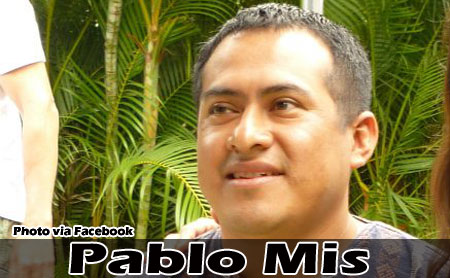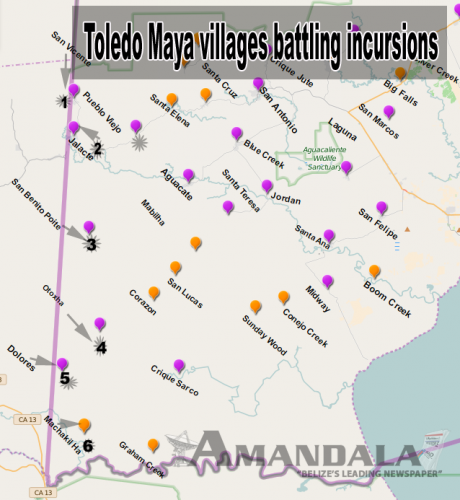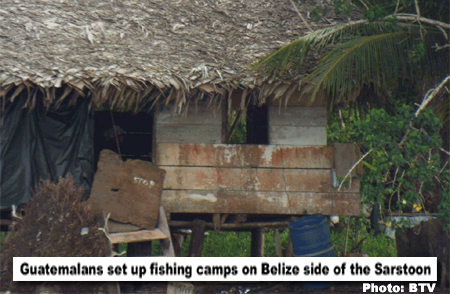TOLEDO DISTRICT, Thurs. Mar. 3, 2016–Since Saturday reports have surfaced that fishers from Guatemala have set up illegal camps on the northern bank of the Sarstoon River well inside Belizean territory. Belize Territorial Volunteer (BTV) founder, Wil Maheia, has said that Belizean authorities have done nothing to address the problem.
Today, when we contacted the Chief Executive Officer in the Ministry of National Security, Ret’d Colonel George Lovell, he told us that he had not been informed of the illegal dwellings, but he did undertake to look into the matter.
In speaking with journalists about incursions by Guatemalans into Belize, Maheia also spoke of incursions along the western border in Toledo in the Columbia forest and near the Maya village of San Vicente. According to Maheia, he got a call two days ago reporting that Guatemalans are pushing across the border in the village of Dolores, where they have been developing pastures. He said that there has not been any response to stop those incursions.
While he called out the Government of Belize, he also called out the Maya Leaders Alliance (MLA), asking them to “jump onboard with this issue…” and to take a stand.
“Those on the Guatemalan side have a great level of boldness in coming further and further into Belizean territory,” said Pablo Mis, coordinator of the Maya Leaders Alliance (MLA) and Toledo Alcaldes Association (MLA), when we asked him to address Maheia’s comments to the press.

In speaking with Amandala today, Mis said that ongoing incursions in the area are a clear and present threat to Maya communities living on the border,that the villagers have had to constantly push back Guatemalans who have been intent on developing illegal pastures and cattle ranches inside Belize.
The Maya villagers live in fear because of violent attacks which villagers and leaders have suffered in the past, Mis explained.
“When night sets in, they have to be concerned about their safety…” said Mis, adding that the actions taken to protest incursions should not aggravate the situation.
“We, of course, admire our colleague [Maheia] and some of our leaders who have participated in the journeys that the BTV have done, but that’s not the end of it,” he commented, pointing to the need for a permanent solution.
Mis took issue with aspersions which he said have been created to suggest that the Maya are not concerned, adding that the Maya continue to defend that territory on a day-to-day basis.
“Those who live along the border live under a great deal of stress, because they are the ones who directly feel the impact when there is a situation along the border,” he told us.
According to Mis, six villages along the border have been most impacted: Machaquilha, Dolores, Otoxha, San Benito Poite, Jalacte and San Vincente, where the story, he said, has been the same.

“If they had not been staunch in their position to defend their land, the situation would be the same as in Chiquibul,” said Mis, adding that Maya presence in those border communities has made a substantial difference.
He pointed specifically to illegal occupation and squatting by Guatemalans in Dolores. Over the years, he said, they have made numerous reports to Belizean authorities to address the border incursions, since it is beyond their ability to tackle the magnitude of the incursions.
“For a very long time, there was great discontent among Maya villages because they have been abiding with directives from Government to refrain from being active in using the adjacency zone [the line a kilometer to the east and west of the Belize-Guatemala border],” but, he said, “to their frustration, they see that the Guatemalans keep coming, closer and closer…” into places like Dolores, Otoxha, and San Benito Poite.
He said that Belizean authorities have not been addressing the incursions to the extent needed and so Maya villagers have begun to protest directly with village leaders on the other side of the border, calling on them to dissuade their residents from venturing into Belizean Maya territory.
At times Belizean authorities who have discovered illegal dwellings and pastures have destroyed them, but Mis said that attempts to curb illegal activities are sometimes met with retaliation from the other side.
He said that when BTV engaged in tree planting on the border some years ago, the Guatemalans were aggravated and soon after an alcalde was shot at and held hostage for four hours. The alcalde was held at gunpoint while his son was told to run for it.
When the Belize Defence Force (BDF) destroys crops, the Guatemalans, who believe the Belizean villagers to be the informants, threaten villagers. Another leader would have been shot in public had the gun of the assailant not jammed, we were told. This, Mis said, happened after BDF destroyed a plantation near Poite.
We asked Mr. Mis for his views on what transpired on Saturday at the Sarstoon, where Guatemalan armed forces blocked a small group of Belizeans who were planning on taking a commemorative trip up the river to the Gracias a Dios border marker, one year after a group of Belizeans were detained and taken to Livingston, Guatemala.
“The Maya were the first to say that this is Belize’s territory. The Maya have long fought for recognition of land rights, and we wish to be made a key part of the fabric of what is Belize. We want to work with the Government; we want to work with any other party which wants to address [the problem] in an objective manner and that takes into [account] the realities on the ground and the practical arrangements that already exist,” said Mis.
We asked Mis what the stance of the Maya community of Toledo is, on the proposal for a referendum to have the Belize-Guatemala differendum heard at the International Court of Justice (ICJ). He said that the community has not yet taken a position, but, he said, the differendum is “a priority point” which had been raised by Toledo alcades and which ought to be considered in discussions with the Toledo Maya Land Rights Commission, installed earlier this year.
Mis noted, though, that although the Commission is specifically responsible for implementing the order of the Caribbean Court of Justice (CCJ), addressing the conflict is critical, since they do not agree with Guatemala laying claim to lands that they have defended as a part of Belize.
Pablo Mis that they intend to be more engaged in the national discussion on the territorial dispute, but added that, “…we have, as a country, failed to take concrete actions on the ground to ensure that we address this national issue appropriately.”

